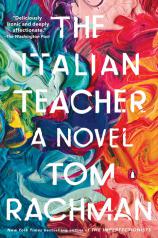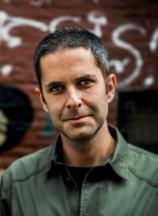The Italian Teacher
Review
The Italian Teacher
After a debut novel-in-stories (THE IMPERFECTIONISTS) and a second that toyed cleverly with chronology (THE RISE AND FALL OF GREAT POWERS), Tom Rachman’s third novel is a more conventional, but no less satisfying, work. An exploration of the high price of creative success, the anxiety of artistic influence and, above all, the eternal tensions between fathers and sons, THE ITALIAN TEACHER is the bittersweet story of how it feels for one man to live uneasily in the shadow of greatness.
For more than five decades beginning in the mid-1950s, Rachman's novel follows the life of Charles “Pinch” Bavinsky, son of famed expressionist painter Bear Bavinsky and his much younger second wife, Natalie, a diligent, but unheralded, potter. Bear is most famous for a collection of works known as “Life Stills,” suggestive portraits that focus on a single body part of his subjects, and for his singleminded devotion to his craft.
He’s equally notorious for his philandering, an activity that eventually produces a brood approaching the size of two baseball teams by the time of his death in his mid-80s. “An artist can’t worry about other people,” a teenage Pinch concludes in an apt summing up of what it’s like to be a dwarf planet orbiting Bear’s sun, after Bear deposits him in a New York hotel room, on his way to yet another assignation.
"THE ITALIAN TEACHER doesn't settle for caricature, but instead honors its protagonist’s humanity with a richly observant and deeply sympathetic portrait."
When Bear cruelly dashes Pinch’s dreams of following in the great man’s footsteps with the words “You’re not an artist. And you never will be” after barely glancing at a work his son painstakingly crafted in the hope of gaining his father’s professional blessing, Pinch decides to pursue a career as an art historian. Even there, his ambitions are stunted when he is rejected by New York University’s Institute of Fine Arts (hastening his breakup with the one true love of his life) and ends up securing his graduate degrees from an obscure Quaker college in suburban Philadelphia. The trajectory of Pinch’s professional life flows downward, eventually landing him a job teaching Italian at a London language school that prizes entertaining its students as much as instruction.
But through all this, Pinch remains more attached to his father than any of his half siblings. He has a relationship that’s no less complicated with his mother, a manic-depressive whose own artistic ambitions were both fueled and stunted by her association with Bear. Reflecting on her question why she never was able to get angry with her ex-husband, Pinch replies, “Because there’s no malice in Dad. He’s just that way. Like a huge ship, powering forward on his mission, and nobody can stop it.”
When Bear dies, after a lifetime of casually incinerating paintings in progress that don’t rise to his exacting standards and resisting efforts to commercialize his work --- preferring to see his art find a permanent home in museums, rather than in the hands of private collectors --- Pinch is left to tend the Bavinsky flame as his father’s sole heir. He must do so while fending off the demands of the needy and less artistically savvy Bear progeny to cash in on their father’s output, modest in size but of inestimable value.
Revealing how he pulls that off, while reclaiming for himself the title of “artist,” would spoil the pleasure of the novel’s climax. Suffice it to say that he hatches an inspired scheme to preserve his father’s fading reputation and at the same time mollify his rapacious kin that’s so audacious (if impulsive) in its conception and so clever in its execution that it can’t help but evoke a wry smile.
In the process of painting Pinch’s clever gambit in swift, bright brushstrokes, Rachman takes some sly digs at the likes of rapacious New York gallery owners, wealthy art collectors and art critics, and other “taste-makers” who “call something important until it becomes so, making themselves important in the process.” One of them, Bavinsky’s biographer Pinch, dismisses as the kind of man who “has no judgment of his own. He admires what one is supposed to.” Rachman's skewering of a pretentious modern art gallery show in the 1970s is also a delightful satiric interlude.
For all the blinding gleam of Bear’s fame, Rachman never shifts his gaze for long from the story of his reluctant acolyte. His own hunger for artistic success thwarted from its inception and longing for love that always seems to dangle just beyond his reach, Pinch Bavinsky is a sad character, but hardly a tragic one. THE ITALIAN TEACHER doesn't settle for caricature, but instead honors its protagonist’s humanity with a richly observant and deeply sympathetic portrait.
Reviewed by Harvey Freedenberg on April 6, 2018
The Italian Teacher
- Publication Date: March 5, 2019
- Genres: Fiction
- Paperback: 368 pages
- Publisher: Penguin Books
- ISBN-10: 0735222703
- ISBN-13: 9780735222700




